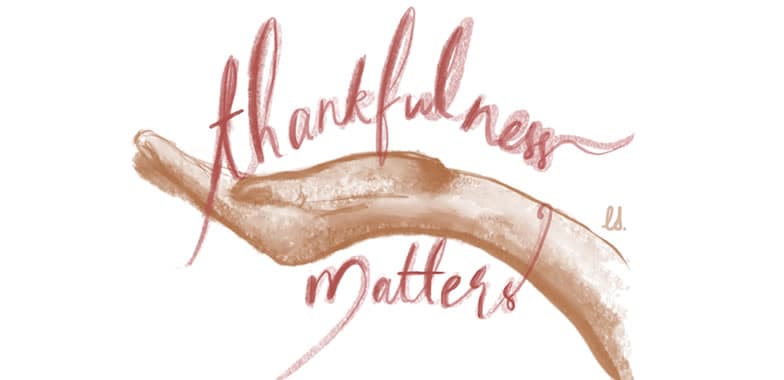
2020 has undoubtedly been a hard year for everyone. We’ve wrestled with a pandemic, a global shut-down, unpredictable and explosive politics, and a generalized sense of anxiety.I’m certain that, if someone had asked any of us in January what we thought this year would be like, none of us would have predicted this. Perhaps unsurprisingly, as we approach the holiday season, few of us feel like celebrating. In fact, sometimes we feel like nothing is even worth celebrating. However, even when seasons are the darkest and most difficult (and maybe even especially then), thankfulness and conscious gratitude carries significant benefits for us socially, psychologically, and physically.
Human beings are, at our core, social beings. A sense of “relatedness” is one of our three innate psychological needs, reflecting its high priority. At the end of the day, we need to know that we belong and that we matter. Because our emotional wellbeing depends on this, it is essential that we invest in close, mutually beneficial relationships. Gratitude can help us with this.
The ‘find, remind, and bind’ theory in psychology shows how a cycle of gratitude benefits our relationships. When we hear someone say, “thank you” and see that they mean it, we subconsciously think of them as an appreciative person, someone who is more likely to be involved in mutually beneficial relationships rather than one-sided ones, making us view friendship with them as a worthy investment. We only have a limited amount of social energy and expressions of gratitude help us find people that are most suited to friendship with us. This is the ‘find’ part of this theory.
Additionally, the ‘remind’ aspect refers to how conscious gratitude reminds us of why we value and invest in the relationships we already have. The ‘shiny object syndrome’ refers to the human tendency to chase something new over what is already ours, and this is reflected in human friendships: we forget why we value the people we care about and get lazy in devoting time to them. Gratitude helps us remember and motivates us to both express our appreciation and continue working hard to invest in our social connections.
Finally, gratitude, both our expression of it and our reception of it, binds us together with others, solidifies our social bonds and boosts our wellbeing. Our thankfulness can fuel acts of kindness, thoughtful behavior, and efforts at meaningful communication, all of which positively influence our relationships.
But conscious gratitude doesn’t just benefit us socially; it also rewires our brain to recognize positive aspects of life more easily and frequently and feel positive emotions more often . Plus, gratitude equips us with more resilience , making crises easier to weather and difficulties easier to endure. The Greater Good Science Center out of UC Berkeley is devoted to the science of wellbeing and has extensively studied gratitude. They released a white paper titled “The Science of Gratitude” which overflows with research-based facts and tips about gratitude. They note that both dispositional gratitude and daily feelings of gratitude are associated with life satisfaction, optimism, subjective well-being, positive affect, and happiness. Essentially, grateful people are happier.
More than that, gratitude is also a game-changer for our physical health. Research has linked gratitude to better overall health, including better sleep, more energy, and lower levels of inflammation. Grateful individuals have better recovery outcomes for injuries and surgeries, such as heart surgery. Plus, grateful individuals are more likely to engage in healthy behaviors, such as exercise.
Given all of this, it’s easy to see that gratitude is good for us. Even so, how can we possibly be thankful when the weight of life and everyday difficulties make gratitude feel impossible? But gratitude isn’t some Pollyanna optimism or blindfolded celebration; instead, conscious gratitude means an acknowledgement of blessings, a reframing of negative circumstances to see both the good and the bad, and a choice to prioritize thanksgiving over complaining. It doesn’t occur in the absence of trouble but in the middle of it.


Shifting our dispositions towards gratitude might feel impossible, but there are tangible strategies and methods that can help . Embracing gratitude can be achieved just like any other behavior change: by breaking the large goal into several smaller ones to make change easier. One smaller goal might be journaling three things that went well that day or keeping a gratitude journal, listing blessings. Another goal might be writing gratitude letters expressing appreciation to people in your life. Another one could be reflecting on your death, recognizing the limited nature of time. Still another strategy might be practicing “mental subtraction” by considering what your life would be like if certain good things hadn’t happened. All of these ideas are called “gratitude interventions” and have been tied to increased levels of gratitude and the corresponding social, psychological, and physiological benefits. Regardless which one you choose, or even if you pick another strategy that fits more in line with your personality, the important thing is that you do it willingly, thoughtfully, and intentionally.
Resetting your perspective and reframing your mindset takes time so be patient with yourself. After one day of implementing gratitude interventions, you won’t be suddenly released from your pessimism and emerge a thoroughly grateful person. Change takes time. But, as you’ve seen through this article, your efforts will benefit you tremendously. Gratitude is worth it!
Resources:
Allen, Summer Ph.D. “The Science of Gratitude.” Greater Good Science Center. May 2018. Greater Good Science Center of UC Berkeley.
Caputo, Andrea. “The Relationship Between Gratitude and Loneliness: The Potential Benefits of Gratitude for Promoting Social Bonds.” Europe's journal of psychology vol. 11,2 323-34. 29 May. 2015, doi:10.5964/ejop.v11i2.826
Edward L. Deci & Richard M. Ryan (2000) The "What" and "Why" of Goal Pursuits: Human Needs and the Self-Determination of Behavior, Psychological Inquiry, 11:4, 227-268, DOI: 10.1207/S15327965PLI1104_01
- Stop Anxiety from Taking Over Your Life - March 8, 2021
- 3 Ways to Bust Stress in 5 Minutes or Less - February 23, 2021
- Want Treatment That Works? Try our Cash-Based Physical Therapy! - February 3, 2021





